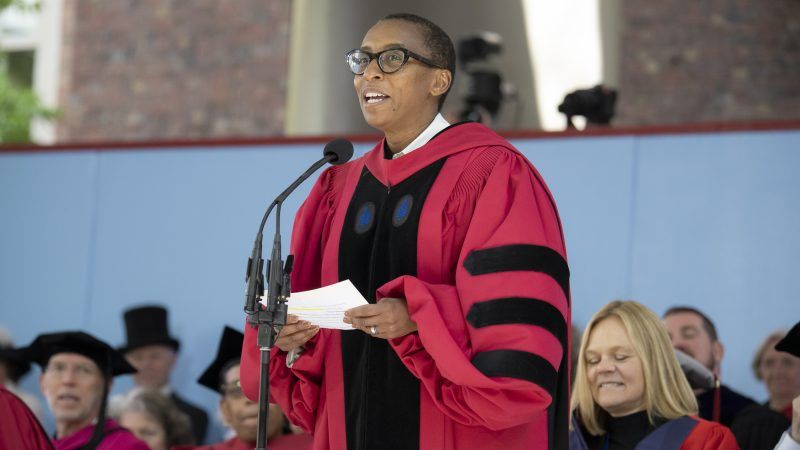If You Ignore Claudine Gay's Plagiarism, Shame on You
Academic malfeasance by Harvard's president deserves media coverage and condemnation, not excuses.

Claudine Gay is the president of Harvard University. In recent weeks, she has come under fire for plagiarizing portions of her 1997 doctoral dissertation, as well as published articles she had authored in recent years.
Examples of plagiarism were first identified by the conservative writer and activist Christopher Rufo, following Gay's much-derided congressional testimony regarding antisemitism on campus. Rufo has all but declared war on the Ivy League, which has prompted many academics to ignore his claims on grounds that he is acting in bad faith; Harvard Law School professor Charles Fried told The New York Times that Gay was fending off an "extreme right-wing attack on elite institutions."
"If it came from some other quarter, I might be granting it some credence," he said, referring to the plagiarism accusations. "But not from these people."
Similarly, NAACP President Derrick Johnson dismissed all criticism of Gay as "political theatrics advancing a White supremacist agenda."
This attitude, though common, is profoundly mistaken. The charges facing Gay are serious, as recent coverage by mainstream outlets—like the Times and CNN—has finally conceded. Neither Rufo's alleged political agenda nor the timing of these revelations should matter if they are in fact true. There's nothing inherently racist or white supremacist about applying Harvard's own standards for students and faculty to the president of the institution. On the contrary, excusing plagiarism at the most elite levels of academia merely because the people calling it out are on the wrong team would constitute a profound betrayal of the very values the academy supposedly values. Harvard, which has done very little to address the charges, should take note.
Rufo's initial reporting, co-authored by writer Christopher Brunet, contended that Gay's dissertation reused sentences from other scholars without adequately rewording them; she cites her sources but does not thoroughly paraphrase. This is a form of sloppy plagiarism in which credit is given but sufficient effort is not undertaken to rework the underlying material. People can disagree about how serious the charge is, but it does appear to violate Harvard's policies.
The Washington Free Beacon's Aaron Sibarium found numerous additional examples of sloppy plagiarism throughout articles published by Gay between 1993 and 2017. Several of the plagiarized scholars—as well as academic experts consulted by Sibarium—agreed that she had committed plagiarism.
It gets worse. Phillip W. Magness, an economic historian who has written for Reason, discovered a passage from a 2014 paper in which Gay inadequately paraphrased other scholars' work and also failed to cite them.
EXCLUSIVE: @PhilWMagness has identified another instance of plagiarism by Claudine Gay, bringing the total to 41 instances across 8 papers over a 30-year time horizon.
In a 2014 working paper titled "Fighting Poverty, Mobilizing Voters: Housing Investment and Political… pic.twitter.com/C2LXTCib8H
— Christopher F. Rufo ⚔️ (@realchrisrufo) December 21, 2023
That's quite a few examples. At some point, lazy plagiarism is still plagiarism—especially when it is accompanied by literal plagiarism.
So far, Harvard has stuck by Gay, merely noting that some of the articles would be reworded to satisfy critics. This did not satisfy CNN's Em Steck, who correctly took the school to task for failing to address "her clearest instances of plagiarism." And according to the Times, the university's review of Gay's work was conducted by Harvard Corporation—the university's governing board—rather than the office of the Faculty of Arts and Sciences, which would normally handle academic malfeasance.
People are free to conclude that Gay's transgressions are not quite serious enough to merit termination. They are also free to point out that such sloppiness is probably rampant in higher education and certainly under-policed. (At some point, though, this isn't really an excuse for Gay—but rather a broader indictment of the entire project of elite education.)
It's baffling, though, that anyone would think Gay's work is above scrutiny because the people scrutinizing it are, to varying degrees, adversarial. Would this work for any Harvard students credibly accused of plagiarism? Could they go before their review boards and say, "My professor is a bad-faith actor, and, thus, these numerous examples of plagiarism must be ignored"? Obviously not; the idea is ludicrous.
Enter Ben Collins, a senior reporter at NBC News who covers disinformation and extremism. Collins believes that mainstream outlets—presumably CNN and the Times—have been manipulated into covering the Gay plagiarism story by Rufo and company.
If you're a mainstream outlet and you're being gamed this easily by a guy who is laying out his playbook days or months in advance, maybe the problem isn't the right-wing grifters.
Maybe the problem is you. pic.twitter.com/R35wFR0EOG
— Ben Collins (@oneunderscore__) December 21, 2023
That declaration—"maybe the problem is you"—is fairly telling. Collins evidently thinks that mainstream outlets should not report on the president of Harvard's well-documented plagiarism because he loathes the politics of the people who first identified it. This is a journalist whose specialty is correcting misinformation, mind you.
If Rufo, or Magness, or Sibarium, or anyone else, had misinformed readers about Gay's plagiarism, then the media should correct them. But that's not really what's being debated here. Media outlets are being told to ignore true information because the information is inconvenient. One cannot find a stronger cautionary tale than that.
Beware the gatekeepers of misinformation who pretend that it is somehow in everybody's best interest if accurate information is kept quiet—and who disdain other reporters for breaking ranks.


Show Comments (167)